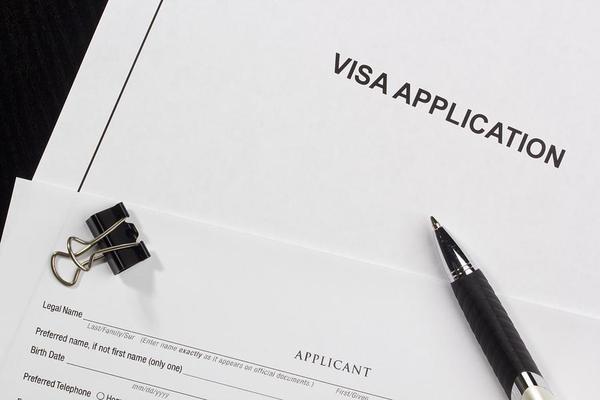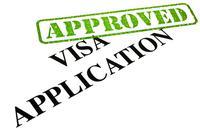When a foreign citizen wants to enter the U.S., he/she is generally required to obtain a visa. There are approximately 185 types, each with its own application procedures, interview requirements, processing times, fees, expiration dates, and rules. The visa is issued by the foreigner’s own country and will become part of his/her passport.
Below our Las Vegas, Nevada visa attorneys discuss how foreign citizens may travel or immigrate to the U.S. In general, visas are divided into two main categories.
- 1. Immigrant visas: For foreigners planning to move permanently to the U.S.
- 2. Non-immigrant visas: For temporary visits such as for business, school, employment, tourism, or waiting for an immigrant visa
Note that the U.S. port-of-entry for foreigners flying into Las Vegas is LAX Airport. That is where Department of Homeland Security (DHS) officers determine whether the foreigner is ultimately admitted.

1. Immigrant Visas in Las Vegas, Nevada
Foreign citizens seeking an immigrant visa typically must obtain a sponsor that has petitioned and been approved by the USCIS (U.S. Citizenship and Immigration Services). This sponsor has to be a U.S. citizen relative, a U.S. lawful permanent resident, or a prospective employer.
Once the appropriate petition has been completed and approved by USCIS, the next step is to complete preliminary processing with the Department of State‘s National Visa Center. At this point, the foreigner will be required to provide:
- An affidavit of support;
- Any and all required applicant documents (birth certificate, marriage certificates, police reports);
- Medical exam and physician information; and
- Complete the necessary interviews for consular processing and give biometrics.
The most common immigrant classifications are (i) family-based and (ii) employment-based:
i. Immigrant relative and family-sponsored
- Spousal visa: For foreigners with a spouse who is a U.S. citizen or legal permanent resident. Note that the U.S. makes no distinction between opposite-sex and same-sex marriage visas.
Also read our article about immigration through adoption.
ii. Employment-based
- EB-1 visa: For outstanding researchers or professors.
- EB-2 visa: For professionals holding advanced degrees (or their equivalent) and individuals sought by the U.S. for their exceptional ability in the sciences, arts, or business that will substantially benefit the U.S.’s economy, cultural or educational interests, or welfare.
- EB-3 visa: For skilled workers, professionals, and other workers.
- EB-4 visa: For religious workers, broadcasters, armed force members, Afghan and Iraqi translators, and more.
- EB-5 visa: For foreign entrepreneurs and investors.
Note that the U.S. currently operates a Diversity Visa Lottery, where foreigners otherwise ineligible for an immigrant visa may enter to win one. This program works to ensure that visas are afforded to citizens of an assortment of countries.
2. Nonimmigrant Visas in Las Vegas, Nevada

Similar to immigrant visas, the non-immigrant application process usually requires petitioning the USCIS, having an interview, and providing evidence of the foreigner’s purpose in traveling to the U.S. Non-immigrant visas usually have a maximum duration of stay. Note that most Canadian travelers do not require a visa.
The majority of non-immigrant visas fall under one of the following categories:
i. Diplomacy
- A-1 visa: For heads of state, public ministers, ambassadors, career diplomats, officers, carrier couriers, and their immediate family.
- A-2 visa: For full-time government employees assigned to their embassy in the U.S., foreign military members assigned to a U.S. base, and their family members.
- G visa: For government representatives attending meetings for an international organization.
ii. Business
- B-1 visa: For people traveling on business.
iii. Tourism
- B-2 visa: For tourists and vacationers.
iv. School and Training
- Academic student (F-1) visa: For foreigners to study at a U.S. scholastic institution.
- Vocational student (M-1) visa: For foreigners to study at a U.S. technical school.
- Exchange visitor (J-1) visa: For research scholars, professors and other exchange visitors taking part in programs that further cultural exchange.
v. Family
- Fiancé(e) (K-1) visa: For people engaged to U.S. citizens.
- Child of Fiancé(e) (K-2) visa: For children of people engaged to U.S. citizens.
- Non-immigrant spousal (K-3) visa: For the spouse of a U.S. citizen (while waiting for an immigrant spousal visa).
- Child of spouse non-immigrant (K-4) visa: The child of a spouse of a U.S. citizen.
vi. Employment
- H-1B visa: For people in specialty occupations requiring bachelor’s degrees.
- H-2B visa: For skilled or unskilled non-agricultural seasonal workers.
- L-1 visa: For managers, executives, and people with specialized knowledge at international companies to work in their U.S.-based offices.
- L-2 visa: For dependents of L-1 visa holders, including spouses and unmarried children under 21.
- O-1 visa: For foreigners with extraordinary ability in either the arts, movies or TV, or sciences, education, business and athletics, to engage in an official activity.
- P-1 visa: For internationally recognized foreign athletes, artists and entertainers to work at a specific event, competition or performance.
vii. Humanitarianism
- U visa: For victims of domestic violence, rape, trafficking, or other abuse.
- Humanitarian parole: For people in emergency situations abroad.
In rare circumstances, an individual will not be required to present a visa in order to be admitted into the U.S. See our article on Visa Waiver in Nevada. For illegal aliens applying for a visa, see our article on provisional unlawful presence waiver.

